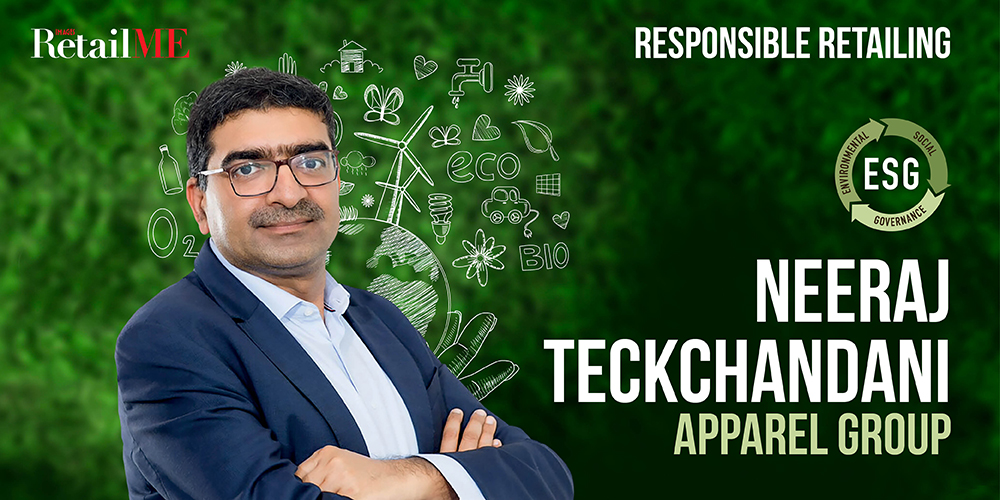
Neeraj Teckchandani, CEO, Apparel Group
With an aim to become more energy-efficient and embrace circular economy practices, regional retail conglomerate Apparel Group has signed a pledge with the UAE government to achieve net zero by 2050.
Before getting into Apparel Group’s roadmap to become a net zero entity by 2050, a quick look at the Group’s sustainability milestones:
What’s more, Apparel Group has initiated full carbon accounting of its operations to understand its current carbon footprint, put in place measures and targets to reduce that footprint, establish a baseline and design a robust net zero journey.
In this context, Apparel Group CEO, Neeraj Teckchandani said, “We’ve been undertaking proactive measures towards greener operations and governance. Back in 2019, we installed solar panels on the roof of our headquarters and parking lot, which currently generate 60% of our energy needs. In 2021, the same building achieved LEED certification and we are currently working towards attaining the same certification for a new building that’s under construction. Moreover, well before the plastic ban, we had already eliminated all plastic bags from our stores, alongside launching the industry’s first cardless loyalty app, therein eliminating the need for millions of plastic cards.”
While undertaking efforts towards creating a positive impact on the planet and people are crucial, measuring impact is pivotal too, and Apparel Group understands this.
“Our carbon accounting process will enable us to implement core metrics or key performance indicators (KPIs) to effectively track and measure our progress. These KPIs will serve as vital tools in monitoring our sustainability initiatives and ensuring that we stay on course towards our environmental goals,” Teckchandani stated.
The power of collaboration
Any meaningful change towards sustainability can’t be done in isolation. For instance, the responsibility of achieving net zero emissions can’t solely rest on the shoulders of governments. Every actor within the private sector must be fully engaged in this mission, Teckchandani emphasised. Collaboration is key to make ESG an industry-wide commitment to drive change, foster sustainability and create a positive impact.
Highlighting Apparel Group’s collaborations with various stakeholders, Teckchandani shared, “We’ve joined forces with the UACA Alliance, which serves as a catalyst for accelerating the momentum of Paris-aligned targets and fostering greater collaboration among private sector entities. By actively participating in this global initiative, we are dedicated to driving collective action towards a sustainable future. Additionally, as signatories of the United Nations Global Compact (UNGC), we have access to their exceptional accelerator programmes. These provide invaluable support in various areas, including climate action and labour rights. Leveraging these resources, we are empowered to navigate our sustainability journey more effectively and make meaningful progress.”
“To bolster our recycling efforts and ensure responsible waste management, we have carefully chosen key recycling partners. As a retailer, we rely on collaboration with mall landlords to implement recycling initiatives and energy efficiency measures. Fortunately, we’ve noticed that there is a collective commitment to sustainability among all stakeholders involved. We are also privileged to be surrounded by a network of NGOs, and by collaborating with them we can better understand and respond to the diverse requirements of the communities we serve.”
A look at roadblocks
Roadblocks are part of any journey, which also leads to crucial learnings. Asked about roadblocks faced by Apparel Group on its ESG journey, Teckchandani said, “One significant challenge we face is the assessment of our Scope 3 emissions, which encompasses a wide range of areas and requires extensive data from various stakeholders. However, we’ve learned that with the implementation of structured processes and systems, we can effectively overcome this challenge and obtain the necessary data for accurate assessments.”
Given that sustainability is still relatively new in the regional business scene, the Group has recognised the need to drive a shift in mindsets and cultivate a culture of sustainability within its workforce.
“This entails not only raising awareness but also providing training and upskilling opportunities to empower our employees. Through this process, we’ve learned the importance of building capacity and fostering a sense of ownership among our workforce as they play a crucial role in accelerating our sustainability efforts,” Teckchandani observed.
“While challenges exist, we’ve learned that having structured processes, focusing on upskilling and fostering collaboration are key factors in overcoming these challenges and driving sustainable practices within our organisation and the broader business landscape,” he concluded.